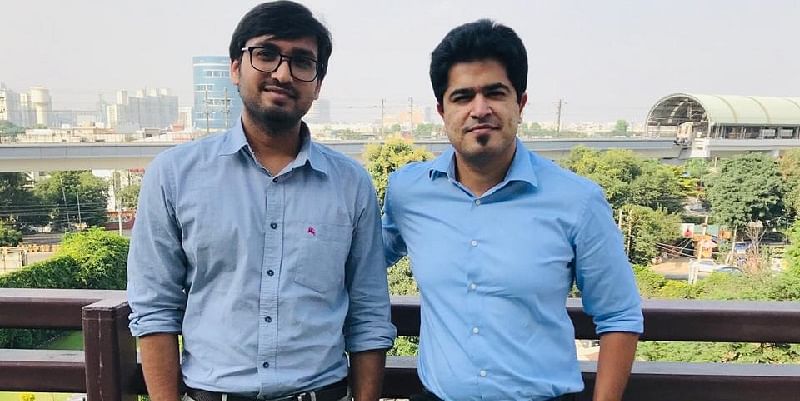Healthtech startup Navia Life Care is simplifying patient care for doctors and hospitals

The coronavirus pandemic has shown that healthcare is the one startup sector that can weather most storms. However, the many departments in most healthcare companies work in silos, which makes it tough to improve clinical outcomes.
It was to change this that Kunal Kishore Dhawan and Gaurav Gupta started Delhi-based healthtech startup Navia Life Care in 2016. Navia Life Care offers smart solutions to healthcare providers to increase patient loyalty, improve outcomes, and drive higher revenues.
“We aim to address the major issue of information asymmetry in the healthcare ecosystem. This includes lack of electronic medical records for easy access by patients and doctors, insights on prescription patterns for pharma, or even smaller-scale issues such as unavailability of waiting times in OPDs for patients or information about drug availability at their nearest pharmacies,” Kunal Kishore says.

Founders of Navia Life
Before starting Navia, Kunal Kishore and Gaurav worked together on a couple of pharma consulting projects. Kunal has a biotechnology and pharma background, and has worked at Fresenius and GSK. Gaurav is a techie with experience in corporates and at Surabhi Foundation.
Both came from families with chronic disease patients, and it seemed only natural to start a healthcare company after studying and working in the field.
In 2018, Nupur Khandelwal joined the Platform-as-a-Service provider as a co-founder. Nupur has a finance background and the other two founders brought her in for her expertise in strategy and consulting.
The Navia Life Care difference
Common problems that crop up at clinical centres include poor patient experience, which starts from the time of booking appointments to getting out of the hospital/clinic. This can take anywhere from 1.5 to 4.5 hours. This is often accompanied by poor record management, leading to poor diagnosis and sub-par clinical outcomes
Navia is going digital to bring efficiency and certainty to patient treatment and enable doctors to quickly and effortlessly create digital prescriptions.
“Patients also face inconvenience for follow-up visits or smaller ailments – not every follow-up requires physical presence or a visit to the hospital. Remote consultations are the need of the hour," Kunal says.
The healthcare ecosystem is complex: it encompasses providers, pharma, patients, and technology enablers. It includes patient-facing or B2C companies such as Practo, mfine, and Lybrate, along with B2B companies such as Navia, Healthplix, Doxper, and others.
“Our products are very simple for doctors to use; there is no change of behaviour required from the doctor or other stakeholders,” Nupur says.
 Also ReadOTTs win over multiplexes in lockdown as Amazon Prime Video sets off ‘direct-to-digital’ in India What does Navia do?
Also ReadOTTs win over multiplexes in lockdown as Amazon Prime Video sets off ‘direct-to-digital’ in India What does Navia do?
Healthtech startup Navia has created a slew of offerings to help streamline healthcare – for doctors, patients, and other stakeholders. These include:
Navi Voice: a voice-enabled smart digital assistant for doctors.Navi Trace: a simple pen and pad device that converts a handwritten prescription into digital format.Navi Scan: a portable scanner system that allows for image recognition-based digitisation of medical records.Navia QM: a seamless queue management and patient flow streamlining system for clinics and hospitals.Navia Video: a teleconsultation platform that is even more relevant in the wake of COVID-19. It lets patients consult their doctors and get prescriptions on video from the safety of their homes. Navi Smart EMR: This product helps doctors and hospitals digitise medical records without change in behaviour or increasing effort.
"Navia’s video consultation platform is integrated with Smart EMR, which allows a doctor to write a digital prescription while having a real-time conversation with the patient. It has an integrated and seamless payment gateway, and easy appointment scheduling for follow-ups,” Kunal says.
“Video calls can be initiated by doctors only at the scheduled time, protecting privacy and personal time.”
Navia won its first customer in late 2016 when the founders reached out to hospitals and doctors in their network with their full-stack concept. They built and evolved the product with the help of their first few customers.
“We were lucky to work with good hospitals and doctors early on. They were very forthcoming with feedback, which helped us in improving the product,” Gaurav says.
Since launch, the company has seen quite a few challenges. But the founders acquiesce that “no startup is complete without challenges”.
"Having a clear understanding of user pain points was the main challenge that we faced. We spent the last two years understanding and perfecting this,” Gaurav says.
“Spending time with doctors and in hospitals gave us a clear understanding of what ails the system, and how the people involved were likely to respond to new technologies or digital solutions.”
In the time of coronavirus, the company aims to continue supporting the healthcare ecosystem and is already working with hospitals for this to track and store patient records.
The business model
Navia runs on a B2B business model focused on clinics, small and medium-sized hospitals, and pharmaceutical companies.
The Platform-as-a-Service (PAAS) player offers a monthly subscription model, which is dependent on the client’s size and ability to pay. It has three products for three types of customers: NaviSmart EMR for doctors and hospitals, Navia QM for hospitals and clinics, and Navia INTERACT for pharmaceutical and life sciences companies.
Customers renew licences every 12 months; Navia claims a 100 percent renewal rate with 125 hospitals.
“We have partnered with local and international companies. International partnerships are always hard to execute. But, we are making our first foray into international markets in the coming months through efficient communication and focus on a good product,” Nupur says.
Navia is working with over 600+ doctors and 125+ hospitals in 10 cities across the country. It is working with a couple of large pharmaceutical companies and diagnostic firms as well. It has also partnered with a healthtech company overseas and expects to get international clients soon.
The focus on keeping costs low and unit economics-positive products has enabled the founders to work with smaller rounds of funding.
Navia raised a seed round and an angel round of investment. The key investor was Benori Ventures, led by Ashish Gupta, Co-founder and former COO of business research company Evalueserve. Other notable investors include Sorabh Agarwal, Dr Rahul Verma, and Mayank Mamtani.
The company did not want to disclose the size of the funding rounds or its revenue figures, as of now.
What comes next?
India's healthcare market is likely to reach $372 billion by 2022, driven by rising incomes, greater health awareness, lifestyle diseases, and increasing access to insurance, according to IBEF.
Healthcare and pharmaceutical industries have traditionally been R&D-heavy and thrive based on their innovation.
Hospitals have relied heavily on manual processes, from patient records to scheduling, and from managing internal processes of patient movement to communication between different stakeholders.
"Technology-enabled patient support programmes have shown a significant impact on the pharmaceutical industry in developed markets. Another area of impact has been the use of data analytics to improve hospital efficiency, which is widely successful in the West. Now, AI is also showing early impact in healthcare,” Kunal says.
As of now, Navia seems poised to take its product overseas successfully. It is working to make the product compliant for other countries and is exploring the Middle East and Southeast Asian markets currently.
“We have received support and interest from doctors and healthcare professionals from many different countries, which is very encouraging,” Gaurav says.
Want to make your startup journey smooth? YS Education brings a comprehensive Funding and Startup Course. Learn from India's top investors and entrepreneurs. Click here to know more.
Original Source: yourstory.com
Visited 756 Times, 2 Visits today
